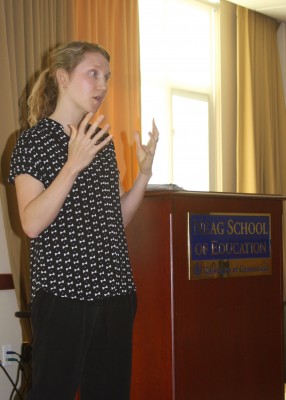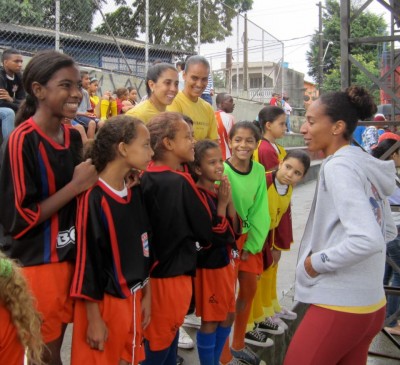
Ethnographer and former professional women’s soccer player Caitlin Davis Fisher recently spoke to UConn’s Neag School of Education Sport Management students about the ability of athletics to promote gender equality.
The former Harvard University soccer captain is the founder and director of the non-profit Guerreiras Project dedicated to educating and empowering women. Named after the Portuguese word for “warriors,” the initiative consists of female soccer players, women’s rights activists, academics and artists who believe soccer can be used to help start the conversations needed to reduce gender discrimination. Currently, its focus is on Brazil, a nation enthralled with soccer though, as Fisher noted, not necessarily with women’s soccer.
Guerreiras Project team members—who currently hail from Brazil, the United States and England— travel throughout Brazil, sharing stories, showcasing game photographs and playing soccer in local communities. Their visits open dialogues on gender stereotypes, as well as provide kids and adults the opportunity to meet strong women confident in their abilities.
“Our project empowers female players to become community ambassadors of the sport and visible role models for kids,” said Fisher. A Massachusetts native, she became a professional soccer player for Brazil’s famous Santos F.C.’s women’s team after graduating from Harvard in 2004.
“I was shocked to learn female players were fed food different from what the men’s team ate, wore men’s jerseys as much as seven years old, had to walk almost an hour to practice, and were forced to wash their uniforms by hand in outdoor sinks,” said Fisher.

Fisher said she was appalled by the treatment, as well as that the Brazilian women on the team thought it was OK. Banned from professional soccer until 1979, the women were just happy to play. Fisher, however, couldn’t ignore their continued struggles, of which not being fully accepted into a “man’s sport” was really just a small part. Lack of financial resources, cultural stereotypes perpetuated by Brazilian media, lack of family support and other challenges continued the view that women were the weaker and less important gender— and inspired Fisher to seek solutions for change.
Through the Guerreiras Project, all involved benefit: “The female players [on the team] build confidence, voice and self-esteem,” Fischer said, “and the youths and adults we visit are encouraged to challenge their own gender biases and to ask questions about what women are capable of doing and becoming.”
The idea for the initiative came shortly after Fisher earned a master’s degree in Gender, Development and Globalization from the London School of Economics and then traveled back to Brazil to reconnect with former Santos teammates. Coupled with ethnographic work she performed on the relationship between body, gender, soccer and economic development, the visit became the cradle for the Guerreiras Project.
Fisher’s visit to UConn came at the invitation of Sports Management Associate Professor Laura Burton. The two met via Skype over the summer, when Burton interviewed Fisher for a textbook chapter that UConn Sports Management faculty were writing.
While on the Storrs campus, Fisher spent time with Sport Management students, staff from UConn’s Husky Sport youth development program, and students in the Women’s Center Violence against Women Prevention Program.
“We are always interested in having our students think critically about the many issues that are part of sports, including homophobia and age, gender and racial discrimination,” Burton said. “The Guerreiras Project shows how much gender discrimination can be infused within just one sport, and the effort required for girls and women to push against constraints if they want to force needed change.”
Hoping that greater awareness about the Guerreiras Project will lead to greater change, Fisher plans to bring the initiative to the United States and study, among other things, “how it might impact girls and women in the U.S. differently than those in Brazil.”
Toward that end, Burton has an idea: “We would love for Caitlin to meet with the UConn women’s soccer team.”
 Facebook
Facebook
 Twitter
Twitter
 LinkedIn
LinkedIn
